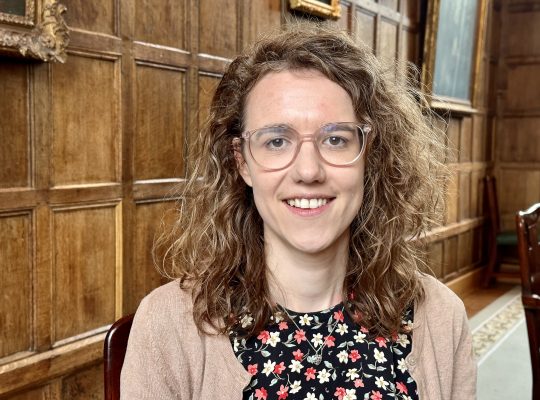
Roles and subjects
Non-Stipendiary Junior Research Fellow in History
Contact
Academic Background
I did my undergraduate and Master’s degrees in History at Oxford before moving to the University of Cambridge for my PhD, which I was awarded in 2021. Following six months as a Research Fellow at King’s College London working on the history of child custody since 1800, I returned to Oxford to teach modern British history at St Catherine’s College. I joined Jesus College in 2023 and am a Leverhulme Early Career Fellow based at the History Faculty. I currently co-direct Oxford’s Centre for the History of Childhood.
Research Interests
My research interests lie in the intersection of the histories of childhood, education, and politics in modern Britain. My Leverhulme Early Career Fellowship project, Practising Democracy: Youth Councils and Parliaments in Modern Britain tells a new story about political participation from 1928 to 2010. Analysing school councils, local authority youth councils, and national youth parliaments, it offers the first history of youth democracy in Britain. This broadens understandings of youth politics beyond apathy and protest and enriches adult-focused histories of democratic culture. The project re-examines narratives of political change, by showing how identity politics, devolution, and Britain’s interactions with international democratic projects were shaped by, and shaped, youth politics. In doing so, it seeks to bring important historical perspectives to current debates on the ‘crisis of democracy’ and lowering the voting age.
I am also writing a monograph titled Playing Parliament: Schoolgirls and Politics in England, 1870-1918. Building on my doctoral research, this reshapes histories of the gendering of politics in England as mass democracy came of age. By positioning schoolgirls as political actors, the book challenges existing accounts of girls’ education in this period. It examines schoolgirls’ active participation in parliamentary, electoral, suffrage, and imperial politics years before women had the parliamentary vote. This helps explain how the first female voters were assimilated into the party system after 1918. In a period of social and political upheaval when ideas about childhood and gender were in flux and Britain reimagined itself as a democracy, educational institutions were fundamental to the political stability that emerged.
Publications
- “The whole world is unquiet”: imperial rivalry and global politics in The London Pupil Teachers’ Association Record’, in The Edinburgh History of Children’s Periodicals, eds. Kristine Moruzi,Beth Rodgers, and Michelle J. Smith (Edinburgh University Press, 2024), pp. 452-68.
- ‘English girls’ schools and women’s suffrage’, in The Politics of Women’s Suffrage: Local, National and International Dimensions, eds. Alexandra Hughes-Johnson and Lyndsey Jenkins (University of London Press, 2021), pp. 163-90.
- ‘Politics in schoolgirl debating cultures in England, 1886-1914’, The Historical Journal, 63/4 (2020), pp. 935-57.
- “Politics for girls”: representations of political girlhood in the Girl’s Own Paper and the Girl’s Realm’, Victorian Periodicals Review, 52/1 (2019), pp. 1-26. Winner of 2018 VanArsdel Prize.
Links
Subject notes for courses taught at Jesus College:
See also the Faculty of History website.
